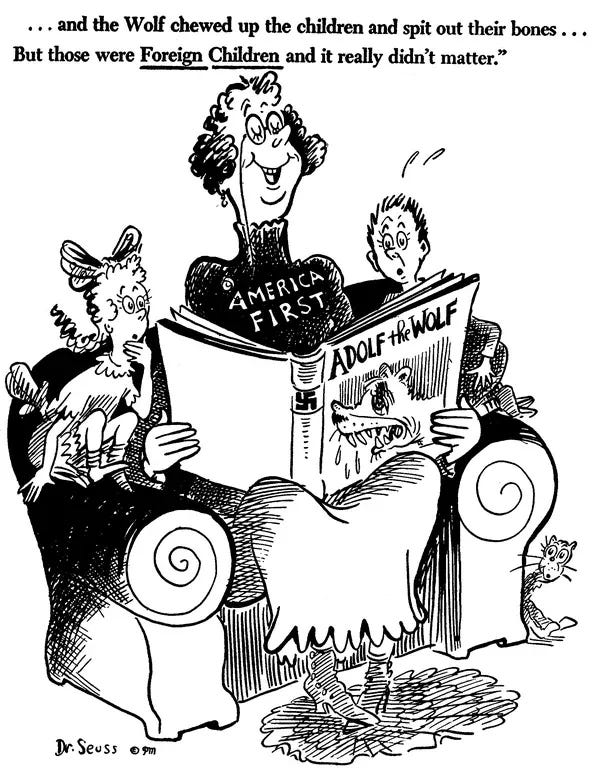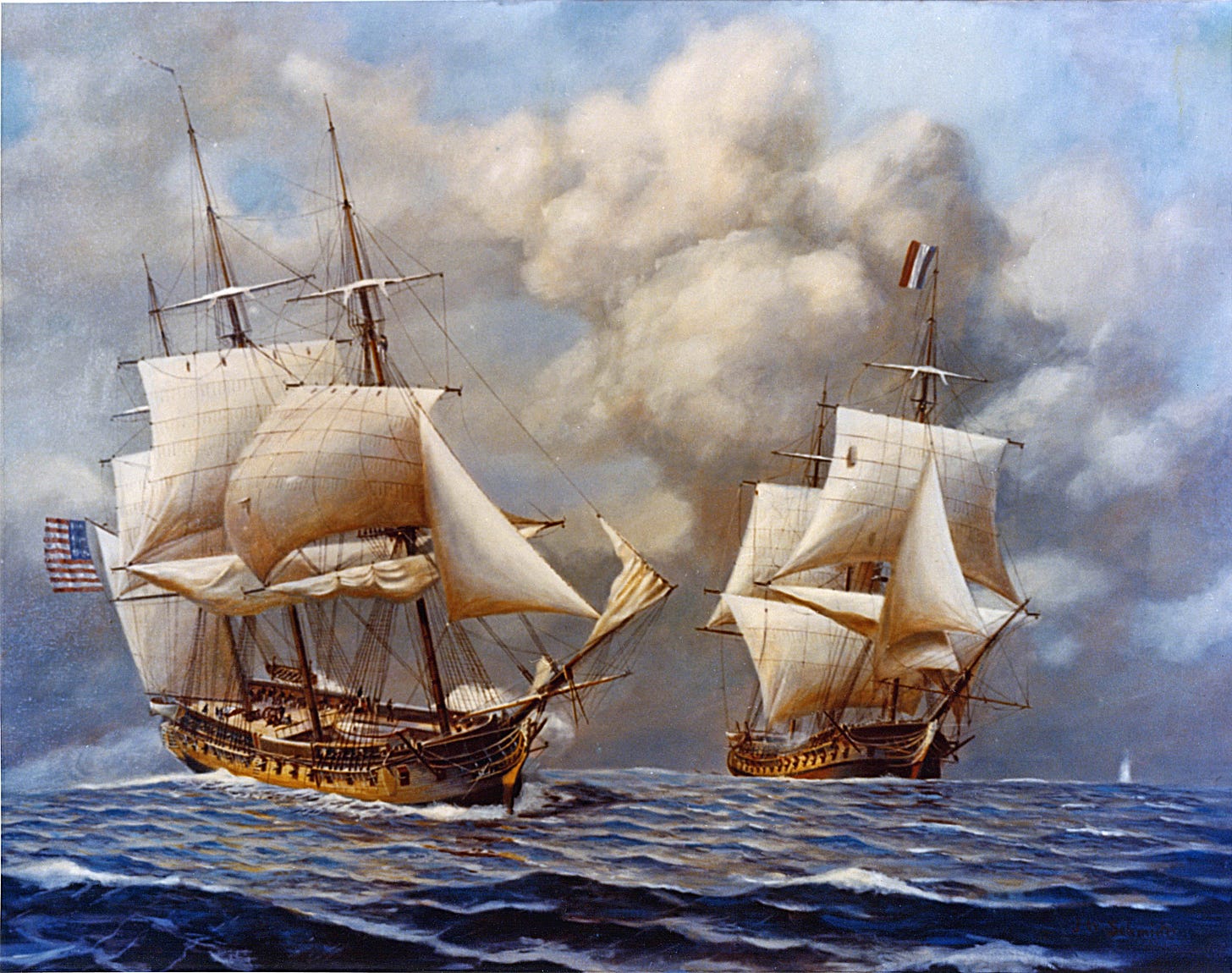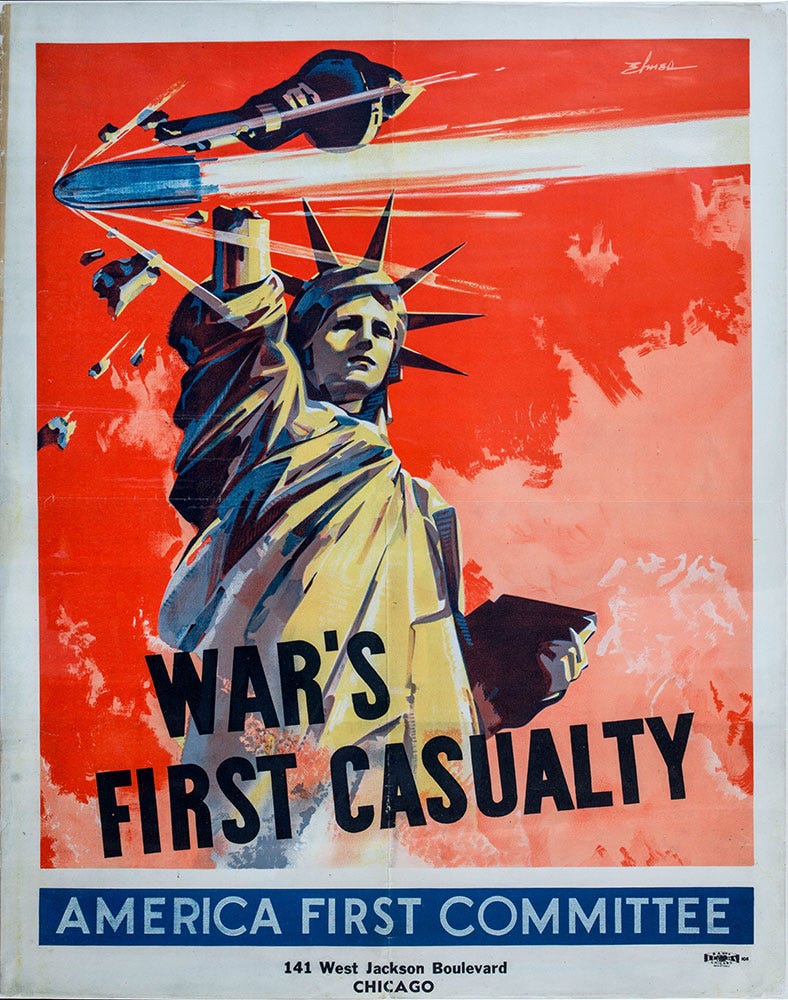"America First": The Lie That Refuses to Die
The history of America first, where we are now, and why it's a terrible idea

There are recurring cycles, ups and downs, but the course of events is essentially the same, with small variations. It has been said that history repeats itself. This is perhaps not quite correct; it merely rhymes.
— Theodor Reik, Essay 3: The Unreachables: The Repetition Compulsion in Jewish History
When you study history, you gain an understanding of how remarkably repetitive and predictable humans can be; there is no original thought under the sun, as it were. The rhetoric behind the “America First” initiative that MAGA has been pushing is no different. We now approach something Trump is calling “Liberation Day” on April 2nd, in which his sweeping tariff plan will be enacted on all of our most important allies and trading partners. So, I thought it would be germane to address the ideology of “America First”, and why it is a poisonous position to take, both for the citizens of the United States and for our position on the world stage.
“Isolationism” After the Revolution:
After the war of independence, quite understandably, many of the founding fathers did not want to get entangled with the European powers, as they had just fought to free themselves from imperial control. This was sensible at the time; the greater European powers were constantly clashing during this era, as they vied for control over more colonial holdings.
The question of neutrality came to a head during the conflicts of the French Revolutionary period, which in many ways was inspired by the American Revolution, and shared several influential figures such as Marquis de Lafayette. Popular sentiment for much of the revolution was with the French, in part because they shared many of our revolutionary philosophies and views, and also because France was our greatest ally during the revolution. However, opinions began to diverge after French revolutionaries beheaded King Louis XVI and Marie Antoinette in 1793, which marked the beginning of the reign of terror. I like the idea of cutting tyrants heads off personally, but the beheadings did get out of hand very quickly. Soon after, Revolutionary France declared war on England, Holland, and Spain, and they were already at war with Austria and Prussia. This led to Washington’s neutrality proclamation, which asserted the neutrality of the United States in this new European conflict.
Many people who supported revolutionary France were not happy with this decision, including Thomas Jefferson, who was previously ambassador to France, as well as his coalition of southern Democratic Republicans. They argued that we owed them aid in return for their help during the American revolution, and that it would be hypocritical to deny aid to a revolution that was ideologically very similar to ours. Alexander Hamilton and his coalition of Federalists argued that the agreement they entered was a defensive one, and since France was the aggressor in this situation, it would be better for the US to withhold aid. Eventually, after a French minister converted a captured British ship into a French warship in a US port, potentially dragging America into the conflict, Congress enumerated into law the Neutrality Act of 1794, which forbid American citizens from waging war against foreign countries that the US was at peace with. This also established the precedent that the executive mostly dictated foreign policy. This position of neutrality was famously emphasized during Washington’s farewell address:
The great rule of conduct for us in regard to foreign nations is, in extending our commercial relations, to have with them as little political connection as possible. So far as we have already formed engagements, let them be fulfilled with perfect good faith. Here let us stop. Europe has a set of primary interests, which to us have none or a very remote relation. Hence she must be engaged in frequent controversies, the causes of which are essentially foreign to our concerns. Hence therefore it must be unwise in us to implicate ourselves, by artificial ties, in the ordinary vicissitudes of her politics or the ordinary combinations and collisions of her friendships or enmities…
Why quit our own to stand upon foreign ground? Why, by interweaving our destiny with that of any part of Europe, entangle our peace and prosperity in the toils of European ambition, rivalship, interest, humor, or caprice? It is our true policy to steer clear of permanent alliances with any portion of the foreign world—so far, I mean, as we are now at liberty to do it, for let me not be understood as capable of patronizing infidelity to existing engagement…
So, why am I telling you all this? Not only do I think understanding this bit of history will help you understand many of the modern precedents of foreign policy, it will also help you recognize a common talking point the right uses to justify their protectionist and isolationist views. Many people will point to Washington’s farewell address as evidence that America’s natural disposition should be against foreign involvement; I’ve even seen such wording in Executive orders and press releases from this administration. Not only is that an appeal to authority fallacy, it also warps the context in which Washington made these statements. America was in its infancy, and incurring the wrath of countries that were much more powerful than us at the time could have resulted in disaster. Furthermore, though the founding fathers talked a big game about staying uninvolved, there was almost no time in our history when we were truly isolated from the conflicts of other countries, because that’s not how the world works. Everything is interconnected, and it has only gotten more and more so into the modern day. For instance, in 1798, only two years after the farewell address, America became involved in a conflict with the French Republic called the Quasi-War, in which American merchant ships were being intercepted as they traveled to Great Britain to trade.

This was a direct result of Congress suspending repayment of loans to France during the French revolution, due to those agreements being made to a government that was now defunct. Furthermore, the Jay Treaty, negotiated by founding father and first Chief Justice John Jay, resolved many territorial disputes between the States and Great Britain that still lingered from the revolution, and also allowed trade between the two countries. These steps towards friendlier relations with the British while Republican France was fighting a war with them provoked their aggressive response during the Quasi-War. So, even in pursuit of neutrality and isolation, the actions America took and the relationships it fostered had consequences on its people.
I can keep going on and on: A few years after that were the Barbary wars, then the war of 1812, then the Monroe Doctrine, then further imperialism and manifest destiny, etc. The point is, though people may point to a few times in the past that America was “isolationist” as proof of concept, we have never successfully remained in isolation for very long.
The Smoot-Hawley Tariff Act of 1930:
Yes, we’ve tried the tariff thing before, and it was just as counterproductive as it is proving to be today. The Smoot-Hawley Tariff Act was an attempt by lawmakers at protecting American farmers from foreign competition. During WW1, and in the period after the war when Europe was recovering, the United States became a massive exporter of food and other material goods in order to supplement the losses of production incurred by Europe during the war. As European farms returned to normal levels of output in the 1920’s, the demand for American produce dropped rapidly, resulting in profit decreases for farmers. The return of European exports also increased competition back home, further driving prices down. A similar pain was felt in many sectors of US industry, and was only compounded by the start of the Great Depression in 1929. In order to combat this, Herbert Hoover, as well as congressmen Smoot and Hawley, created a wide-scale tariff plan that was supposed to reinvigorate American industry by protecting it from outside competition. As you can probably guess, it did the opposite, instead triggering counter-tariffs and further destroyed the American export market. These tariffs deepened and prolonged the Great Depression, and strained our foreign relationships during a time where free trade could have helped stimulate the economy. The lesson we learned from this and many other attempts at blanket tariffs is that “protectionist” policies, and particularly tariffs, do more harm to American markets than good.
*As an aside, Hoover, Smoot, and Hawley were Republicans, but it should be noted that the Republican party of the early 20th century was very different from the Republican party of today. So while it is a funny coincidence, them being Republican doesn’t add much to the overall argument I’m making here, and I try not to engage in such surface level comparisons.
The America First Committee of 1940:

Founded by Charles Lindbergh, an American aviator who flew the first solo transatlantic flight, the America First Committee was formed to oppose American intervention in World War 2 in response to British requests for aid.
Though I find the sentiment that America should have stayed out of the war wrong and selfish, it was at least coming from a more understandable point of view in the 30’s and 40’s. The world was rocked by the unimaginable “war to end all wars” just two decades before, and the notion of fighting another such land war in Europe was not an exciting prospect to anyone. To many at the time, it seemed that Europe was doomed to fight until it destroyed itself. After all, the league of nations failed, and every effort to prevent another war backfired. In hindsight, it is clear that the heavy-handed nature in which the European powers handled Germany, Austria-Hungary, and the Ottoman Empire caused the destitution and resentment that built to another war, but at the time it seemed like having that many powerful nations neighboring each other without breaking them up would inevitably lead to conflict. There were also other influences that built this isolationist sentiment amongst the public, such as the huge influx of immigration coming through Ellis Island in the late 19th and early 20th centuries; And of course, the arguments were the same as they are now about how immigrants were criminals and stealing jobs, the only difference was they were Italian and Irish instead of Mexican. Regardless, the America First Committee was formed in the hopes of avoiding another conflict as bad as WW1:
“…I believe it will be a tragedy to the entire world if the British Empire collapses. That is one of the main reasons why I opposed this war before it was declared, and why I have constantly advocated a negotiated peace. I did not feel that England and France had a reasonable chance of winning. France has now been defeated; and, despite the propaganda and confusion of recent months, it is now obvious that England is losing the war. I believe this is realized even by the British government. But they have one last desperate plan remaining. They hope that they may be able to persuade us to send another American Expeditionary Force1 to Europe, and to share with England militarily, as well as financially, the fiasco of this war.
I do not blame England for this hope, or for asking for our assistance. But we now know that she declared a war under circumstances [that] led to the defeat of every nation that sided with her from Poland to Greece. We know that in the desperation of war England promised to all these nations armed assistance that she could not send. We know that she misinformed them, as she has misinformed us, concerning her state of preparation, her military strength, and the progress of the war…
…But we in this country have a right to think of the welfare of America first, just as the people in England thought first of their own country when they encouraged the smaller nations of Europe to fight against hopeless odds. When England asks us to enter this war, she is considering her own future, and that of her Empire. In making our reply, I believe we should consider the future of the United States and that of the Western Hemisphere.”
Sound familiar? It should, because it is very similar to the arguments Trump’s admin. is using against supporting Ukraine, and similarly fails to see two very important things: the first being that rolling over and continually appeasing an aggressor accomplishes nothing, especially when a state is defending its sovereignty; furthermore, it is in America’s best interest to stop a common enemy as early as possible, because otherwise they will gain more power, and be in a better position to oppose America down the line. To be fair to Lindbergh, he was not a Nazi supporter (unlike Trump, who probably calls Putin daddy behind closed doors). There were other isolationist groups at the time that were pro Nazi, but the AFC was not one of them, and Lindbergh actually rejoined the armed forces as an airman after Pearl Harbor. Nonetheless, by taking the position of appeasement toward the axis, I would argue that Lindbergh unwittingly became a pseudo-supporter of the Nazi invasion of Europe. Take that as you will as it applies to the modern day.
Make America Great Again:
And so we circle back to today to complete the historical rhyme. We’ve got all the classics in play: Sweeping tariffs to “protect American industry”, a huge amount of anti-immigrant sentiment, hatred of Europe and any sort of global coalition, and we’ve even got our very own America First Committee called the America First Policy Institute. Don’t you just love regressing as a society, and relearning the same lessons we’ve already learned? The particularly problematic aspect of its current iteration, though, is that we are trying all these things at the same time, and in rapid succession. Stuff like tariffs is already a shock to the system, and it is doubly so when they are completely unexpected and unprepared for.
America First Doesn’t Need to be America Only:
The biggest thing I want to point out today is that there is a key difference between interventionism and isolationism, and too many political pundits are conflating the two. I think we would all agree that America should not force its will onto other countries like it did in Latin America and the Middle-East. That is interventionism, and is something I condemn. However, there is a difference between that and coming to the aid of our allies and countries who’s sovereignty is being violated, as well as providing material support to countries that are struggling in some way.
We are the richest nation on Earth for a reason, and that is because the rest of the world invests in us. America is uniquely situated away from any major hostile powers, has vast natural resources, a large population, and is basically impossible to invade. After WW1 and WW2, we emerged as the only major nation still fully intact, so we were able to provide aid and resources to our allies, and distinguished ourselves as the safest place in the world to invest in. As a result, we have the biggest stock market, hold the global reserve currency, and have been allowed to establish ourselves as the world superpower through leverage of the good will we earned from that support (and a lot of forceful intervention in other places unfortunately). Things like USAID are a continuation of that establishment of good relations and soft power projection. But I guess lets throw all that away so that we can…? I don’t even know what this administration is trying to accomplish. This will only result in pain for us and more countries investing in China. When you manage to get China, Japan, and South Korea to work together in response to US tariffs, you know you’ve fucked up big time. They hate each other.
The great fallacy that people delude themselves into believing is that if we withdraw from the rest of the world, then the money will be spent here on America’s citizens, and that the common man will ultimately benefit from all of this. There is no reality in which that is the case. Republicans have no interest in benefiting the common person; everything they are doing now is a way to cut the budget so that they can pay for the extra $5 trillion the US debt will incur over the next decade from cutting taxes for the rich. These tariffs, which Trump has now said are planned to be levied against every country, will only make things more expensive, and will ultimately hurt the export markets that employ millions of people when other countries retaliate. We don’t need to get rid of all of these things to improve the lives of the lower and middle class, and we certainly don’t need to become hostile to other countries. I don’t think people conceptualize just how insanely rich we are as a country. We can do it all! We can help other countries and help ourselves at the same time, it is not either or. And if a little money is spent to help other countries and it doesn’t benefit us, then so be it. What’s so wrong with helping other human beings? We’re talking a fraction of a percentage in the budget. I can spare a dollar in taxes to help fight AIDS and Ebola in Africa, or feed starving children, or help other countries recover from disasters.
The essential issue that I have with the argument people present for isolationism is this: so-called “neutrality” is almost never truly neutral. No matter what you do, your actions will effect someone, and every relationship we develop with other countries will come to benefit or harm us is some way down the road. The media has sensationalized the word globalist as some sort of massive conspiracy, but we undeniably live in a globalized world, and there is no escaping from that fact. Even just looking from the point of view of what’s best for Americans, fostering certain relationships with foreign countries and showing them we are reliable allies pays dividends down the road. It has never and will never be in the best interest of America to stay isolated from the rest of the globe. Not economically, nor defensively, nor strategically, nor politically. There is no fixing Pandora’s box. We can abdicate our responsibility to the rest of the world and pretend to be the lone cowboy all we want, one day the world will come knocking on our door regardless; when that day comes, we will find ourselves in a deep deficit of trust, and mired in a palpable resentment.
People’s Veto Protest on April 5th: https://www.seeyouinthestreets.com/
Contact Your Representatives: https://5calls.org/
5051 (organizes protests): https://www.fiftyfifty.one/
The General Strike: https://generalstrikeus.com/
If you would like to know more about protest methods and organizations, here is my article on the subject: We March to Revolution: A Call to Action & Ways You Can Fight Back
And here is a more general article about Fascism in America today: American Fascism: What to Expect and How to Prepare
Ever vigilant, your eyes in the sky,
~Minerva






The his is such a well thought out argument for remaining engaged in world economic affairs and promoting USA good will. The failure to realize this small marble we all inhabit has continuous effects on everything we do or fail to do will lead to deepening costs of not just dollars but influence and needed cooperation ahead.
“America First” is the political equivalent of a toddler yelling “Mine!” at a sandbox it didn’t build. It's not patriotism; it’s cowardice wrapped in nostalgia drag. We've tried this isolationist, protectionist tantrum before: it gave us the Great Depression, Lindbergh’s Nazi-adjacent mutterings, and decades of foreign policy blowback. Trump’s tantrum tariffs are Smoot-Hawley with a spray tan, delusional economic self-sabotage masquerading as strength. And when the fallout hits, the MAGA crowd won’t blame the billionaires lighting the matches, they’ll blame immigrants, queers, and women for the fire. Again.